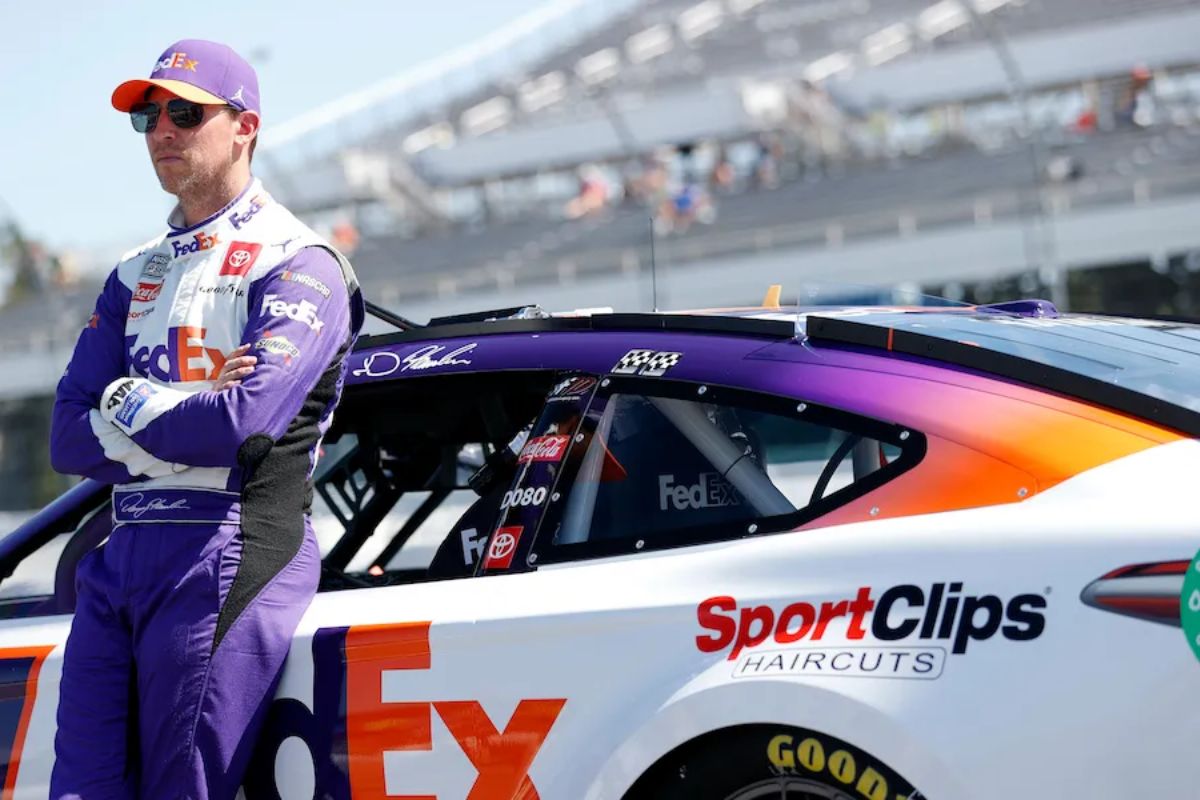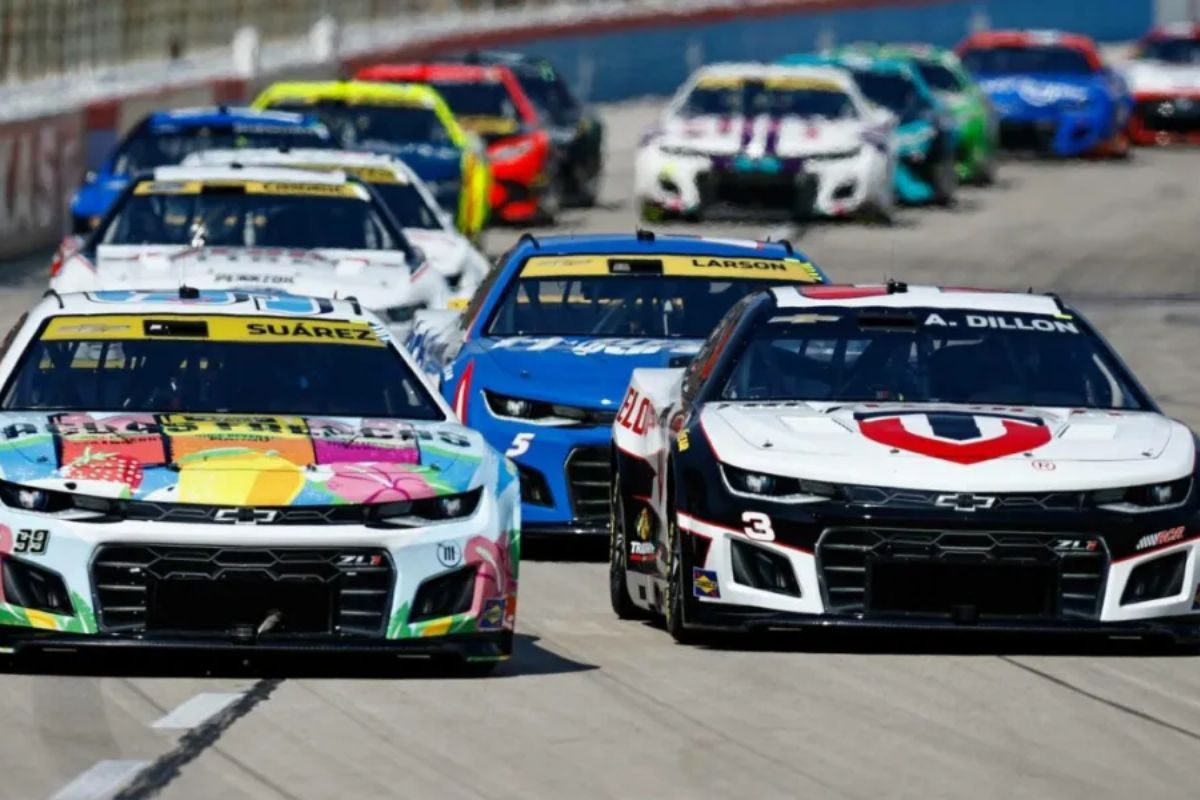Denny Hamlin Slams Brad Keselowski: The recent argument between Denny Hamlin and Brad Keselowski over NASCAR’s practice policies has thrown a spotlight on a critical and controversial issue within the sport. Hamlin’s critique of Keselowski’s view on the economic implications of extended practice sessions not only shows the complexity of achieving a balance between cost-efficiency and peak performance but also reflects a broader existential debate within NASCAR. As stakeholders struggle with adjusting financial sustainability with the competitive ethics and spectacle of racing, this controversy invites a deeper examination of the strategic, economic, and cultural dimensions shaping the future of NASCAR’s practice policies.
Key Takeaways
- Denny Hamlin criticizes Brad Keselowski’s skepticism about the economic benefits of reduced practice sessions in NASCAR.
- The debate highlights differing views on cost-effectiveness and competitive fairness of minimal practice.
- Hamlin emphasizes the financial strain excessive practice places on teams, especially smaller ones.
- Keselowski questions the economic reasons , suggesting reduced practice may not significantly cut costs.
- The discussion reflects broader concerns over race quality, safety, and the role of simulation technology in driver preparation.
Pandemic Changes
In response to the COVID-19 pandemic, NASCAR implemented significant modifications in 2020, particularly eliminating practice sessions to adapt to the unusual challenges and guarantee the sport’s continuity. This strategic alteration was part of a broader effort to reduce exposure risks and manage logistical complexities brought by the pandemic, showing the organization’s agility in crisis management. The decision, while primarily driven by health and safety considerations, also introduced a new dimension of competitive strategy and operational efficiency within the sport.
The removal of practice sessions calls for a reevaluation of team strategies and driver preparedness, pushing teams to maximize performance under constrained conditions. This point not only reflected NASCAR’s commitment to safeguarding its community but also its capacity to sustain the competitive integrity and excitement of the sport amidst external pressures. The adaptation showcased a proactive approach to maintaining operational continuity, ensuring that the racing calendar could proceed with minimal disruptions.

Minimal Practice Sessions
With the pandemic’s aftermath, NASCAR’s decision to continue with minimal practice sessions emerged as a contentious issue among stakeholders, sparking huge debates on its long-term implications for the sport. Initially implemented as a cost-saving measure, this approach has fundamentally altered the pre-race preparation landscape, prompting a reevaluation of strategies among teams and drivers.
The fewer practice sessions represents a model shift in NASCAR’s operational philosophy, contrasting economic sustainability against the traditional model of extensive on-track preparation. Supporter argue that reduced practice times level the playing field, offering smaller teams a fighting chance against well-funded counterparts by minimizing the financial burden associated with extensive track time. Others, critics the lack of practice compromises the quality of racing, potentially impacting driver safety and the overall competitiveness of events.
This debate underline the complexities of balancing economic considerations with the competitive integrity and safety standards of the sport. As NASCAR navigates this challenging situation, the decisions made in this domain will surely shape its future direction, influencing not only the competitive landscape but also its broader appeal and financial health.
Racer Reactions
Different opinions among racers, such as Brad Keselowski and Denny Hamlin, highlight the complexity of the debate surrounding NASCAR’s minimal practice sessions. This shows a complex issue that extends beyond mere track time to encompass broader implications for team strategy and performance.
Keselowski’s skepticism about the economic reasons behind reduced practice underscores a concern for how such limitations might disadvantage teams that rely on these sessions for car optimization and driver adaptation. His perspective suggests that the value of practice transcends its apparent cost, hinting at deeper layers of tactical preparation that are essential for competitive success.
“I haven’t seen how we’ve saved any money getting rid of practice, not from a team perspective. Maybe there were some savings in other ways in the industry that I’m not aware of, but there haven’t been significant cost savings”.-(Brad Keselowski)
On the other side of the debate, Hamlin’s stand foregrounds the financial pressures that extended practice sessions could impose on teams. His argument illuminates the balancing act between maintaining high performance standards and managing operational costs. Hamlin’s viewpoint reflects a sensible approach to the reality of racing economics, where the allocation of resources plays a important role in determining a team’s feasibility and success.
“I heard Brad, and it bugs me a little bit, ‘all we need is more practice, it’s not gonna cost anyone’. That’s not true.”
“someone who has never made a cash call before.” He further said, “You have to buy quite a bit more. You have to come to the race track earlier, and that’s an extra night of hotel rooms.”-(Denny Hamlin)

The Financial Burden of Extended Practice Sessions
Exploring the financial dimensions of NASCAR’s practice debate reveals a complex landscape of costs that teams must navigate, from travel expenses to accommodation requirements. Denny Hamlin’s pointed critique shows the significant economic consequence that the reintroduction of extended practice sessions could have on teams across the spectrum of NASCAR’s competitive hierarchy. This financial burden, as highlighted by Hamlin, includes not only the direct costs associated with additional track time but also the expenses that accrue from elongated stays at race locations, including but not limited to, travel and accommodation for team members.
The debate over practice time is not merely a question of competitive fairness or sporting integrity; it is fundamentally intertwined with the operational and financial sustainability of racing teams. The NASCAR ecosystem is diverse, with teams operating under varying budget constraints. For smaller, less financially robust teams, the additional costs implied by extended practice sessions could represent a considerable strain on their resources, potentially exacerbating the competitive disparities within the sport.
Simulation vs. Reality
Amid the financial concerns raised by Denny Hamlin, another dimension of NASCAR’s practice debate surfaces: the contrasting views on the efficacy of simulation technology versus real-world practice. The heart of this debate lies in the question of whether virtual environments can adequately substitute the tactile, physical, and unpredictable nature of real-world racing tracks. Brad Keselowski and a faction within the sport argue that, despite technological advancements, simulators fall short of capturing the essence of on-track practice. This perspective underscores a critical analysis of the limitations inherent in simulation technology, emphasizing the nuances that can only be obtained through actual driving experiences.
The contention pivots on the simulators’ ability to replicate factors such as track texture variations, weather conditions, and the dynamic responses of the car under race-day stresses. Critics argue that these elements are essential for a driver’s skill development and race preparation, suggesting that reliance on simulation could lead to a gap in real-world performance capabilities. This stance advocates for a balanced approach to practice, where simulation serves as a supplementary tool rather than a complete replacement for on-track sessions.

News in Brief
The ongoing debate within NASCAR regarding the ideal duration and frequency of practice sessions shows a complex interplay between economic considerations and the pursuit of competitive equity.
Denny Hamlin’s criticism of Brad Keselowski’s stance highlights the divergent perspectives within the racing community, reflecting deeper questions about cost management, technological reliance, and the essence of sporting fairness.
As the discourse evolves, NASCAR faces the challenge of reconciling these varied viewpoints in shaping future practice policies to sustain the sport’s integrity and viability.
Our Reader’s Queries
Q: Has Denny Hamlin ever won a championship?
A: Denny Hamlin holds the record for the most wins in the NASCAR Cup Series without clinching a championship. Despite this elusive title evading him, Hamlin has consistently remained a formidable contender for the championship, showcasing his talent and competitiveness throughout his illustrious career.
Q: What happened to Brad Keselowski racing?
A: Founded in 2007, the team was headed by NASCAR Cup Series and Xfinity Series champion Brad Keselowski. Fielding the Nos. 19 and 29 Ford F-150s for drivers Austin Cindric and Chase Briscoe, the team operated until announcing its suspension of operations post the 2017 season on August 17, 2017.
Also Read: Did Denny Hamlin-SMI Drama Fool Fans? Insider’s Insight!


